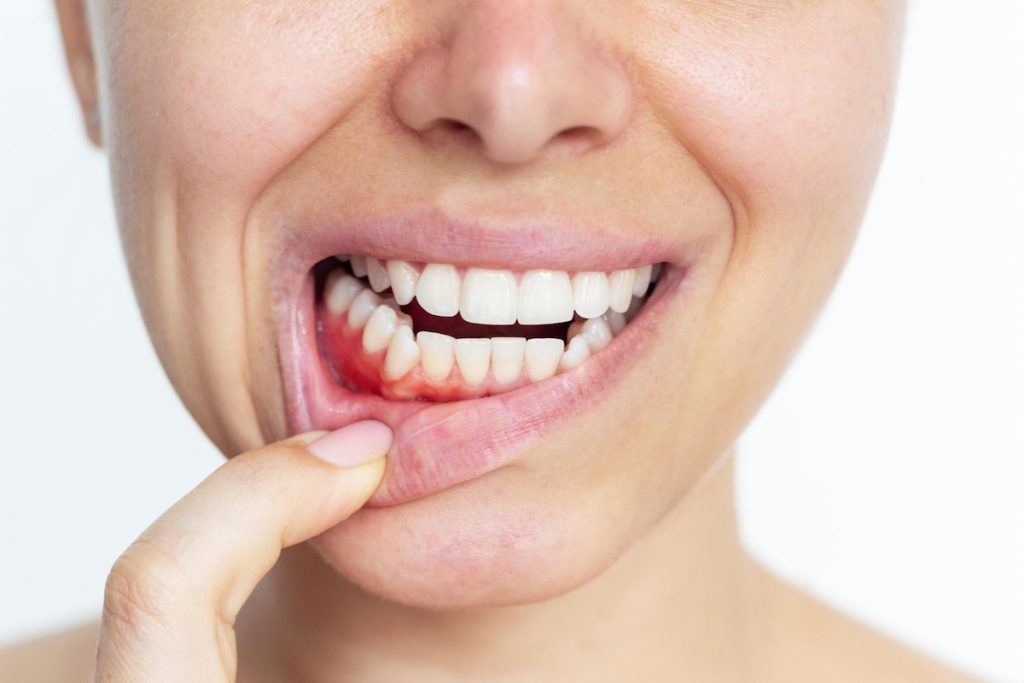Why Do My Gums Bleed?

Have you ever been brushing your teeth and noticed your gums starting to bleed? It may seem like it happens for no reason, but that’s not entirely true. Bleeding gums are a common issue that affects up to 1 in 5 Australians.
It can happen to anyone, from young children to older people. While sometimes it’s just a simple plaque build-up, it can also be due to pregnancy, medicines, or even a severe condition like advanced gum disease (periodontitis).
In this article, you’ll learn why your gums might be bleeding and what you can do to prevent it.
Why Do My Gums Bleed Easily?
Bleeding gums are often caused by plaque build-up along the gumline. Dental tartar is the thick, greyish-white sludge of bacteria that coats the teeth. When you don’t brush it off properly, it attracts germs. Your body reacts by sending more blood to the area to fight off the germs, leading to inflammation and bleeding when you brush.
What Causes Bleeding Gums?
Your gums may bleed for several causes, including:
Gingivitis
Gingivitis is most often the cause of early-stage gum disease that bleeds easily. It occurs when plaque build-up leads to inflammation of the gums. If treatment is not received, it might result in swollen, sensitive, and bleeding gums. Fortunately, proper brushing and flossing practices and routine dental examinations can effectively treat gingivitis.
Poor Brushing and Flossing Habits
Not brushing or flossing correctly allows plaque to build up, which attracts bacteria and leads to bleeding. To prevent this, make sure you’re brushing and flossing correctly. Gently brush the gum line to get rid of plaque and bacteria.
Medicines
Some pharmaceuticals, such as blood thinners, can make gums bleed more easily. These medicines decrease blood clotting, which can lead to easier bleeding. Always inform your dentist about any medicines you’re taking.
New Flossing Habit
You might notice some initial bleeding if you’ve recently started flossing regularly. This is because you’re removing plaque and bacteria built up over time. Keep flossing; the bleeding should subside within a week as your gums become healthier.
Pregnancy Gingivitis
Pregnancy can cause hormonal changes, making your gums more susceptible to inflammation and bleeding. This condition, known as pregnancy gingivitis, usually clears up after pregnancy or when hormonal balances return to normal. The symptoms can be controlled with routine dental exams, brushing, and flossing.
How Do I Stop My Gums from Bleeding? What Treatment Is There?
Back to Basics: Brush Better and Floss Better
To prevent and manage bleeding gums, proper brushing and flossing are essential.
How to Brush Better:
- Angle Your Brush: Start at the back of your mouth with the toothbrush bristle at a 45° angle at the gum line. Brush gently in a circular motion.
- Gentle Massage: Brush the gum line like a massage. Avoid scrubbing side to side, as this can cause your gums to recede and damage tooth enamel.
- Cover All Surfaces: Brush carefully along the inner, outer, and chewing surfaces. Make sure to tip the toothbrush to reach the inner front areas of the teeth.
- Don’t Rinse Immediately: Spit out the toothpaste after brushing, but don’t rinse it with water. Leaving some toothpaste on your teeth provides extra protection.
How to Floss Better:
- Tightly grasp the floss between your thumbs and index fingers to get the Right Length, winding about 30 to 45 centimetres around your middle fingers.
- Gentle Guidance: Guide the floss between your teeth, not cutting or damaging your gums with abrupt movements.
- Up-and-Down Motion: Gently move your hand up and down one side of the tooth to just below the gum collar and then back up the other.
If using traditional floss isn’t comfortable, consider using a floss threader or a floss pick.
See a Dentist
If you’ve improved your brushing and flossing habits but still notice bleeding, it’s time to see your Seven Hills dentist. They can do a complete examination and diagnostic to establish the root cause of your bleeding gums. Regular dentist appointments every six months are necessary to preserve oral health and avoid significant problems.
Can I Use Mouth Rinse?
While mouth rinses can kill bacteria and freshen breath, they are not essential for preventing bleeding gums. Proper brushing and flossing are more effective in removing plaque and bacteria. Mouthwashes won’t stop bleeding if plaque and tartar accumulate along your gum line.
Gum Treatments in Seven Hills
Bleeding gums are a common issue caused by various factors, from poor oral hygiene to medicines and hormonal changes.
The key to preventing and managing bleeding gums is to practise appropriate brushing and flossing techniques and schedule routine dental visits.
My Local Dentists firmly believe in educating our patients to help them understand how to achieve good oral health.
Contact your Seven Hills dentist at (02) 8605 1696 or schedule an appointment online.
We are at Shop 55, (Ground Floor) Seven Hills Plaza, 224 Prospect Hwy, in Seven Hills.
